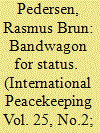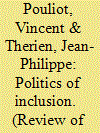| Srl | Item |
| 1 |
ID:
158106


|
|
|
|
|
| Summary/Abstract |
Why do the small Nordic states engage themselves in militarized interventions alongside the United States? The article argues that the Nordic states gradually have begun to perceive militarized coalition participation as an important tool to gain reputation and improve their status position. A good relationship with the United States is considered as a means to either consolidate or improve their relative status position and also secure protection or ‘shelter’ against regional competitors by improving their reputation. Empirically, the article contributes to our understanding of the status-seeking strategies of the Nordic countries and how they might have utilized a more militarized activism to seek status that departs from the traditional Nordic internationalism. Theoretically, the article contributes to our understanding of the concept of ‘status’ in international relations by offering a new explanation of the puzzling willingness of small states to use military means in international conflicts where immaterial gains play a larger role than otherwise assumed in the realist small-state literature.
|
|
|
|
|
|
|
|
|
|
|
|
|
|
|
|
| 2 |
ID:
148819


|
|
|
|
|
| Summary/Abstract |
This article examines the contribution of competitiveness and trade product structure to China’s commercial links with ten states located in Central and Eastern Europe (CEE). A constant market share analysis for the 2002–2011 period shows that, except for Romania, both CEE states and China increased their market shares in each other’s market mainly due to their improved competitiveness in intermediate goods. However, with the notable exception of Slovakia, other CEE economies and China tended to gain market shares in product groups characterised by relatively non-dynamic import demand growth. This mismatch between the Competitiveness and Structure Effects points to the room for an expansion of China–CEE trade.
|
|
|
|
|
|
|
|
|
|
|
|
|
|
|
|
| 3 |
ID:
139576


|
|
|
|
|
| Summary/Abstract |
The debate on the reform of the Security Council can be conceptualised as the most recent episode in the evolution of World Governing Councils (WGCs), that is, the highest-level intergovernmental bodies charged with regulating the international use of violence. Building on a historical comparison of key formative and transformative moments – 1815, 1919, 1945, and post-Cold War – we argue that the modern evolution of WGCs is characterised by increasing inclusiveness. More specifically, we show that the number of participants involved in deliberations has constantly risen; that legitimating principles have gradually tilted in favour of ‘input legitimacy’; that the constitutive rules and procedures have steadily gained in transparency; and that the WGCs themselves have comprised an expanding membership with a decreasing number of veto points. At the theoretical level, these converging trends can be explained by the existence of a ‘ratchet effect’ whereby new norms and practices of inclusion accumulate over time. However concrete and long lasting, the democratic gains registered in the process must be cast in terms of historically specific politics and struggles rather than in terms of lofty ideals promoted by altruistic norm entrepreneurs.
|
|
|
|
|
|
|
|
|
|
|
|
|
|
|
|